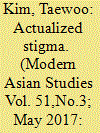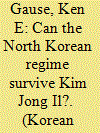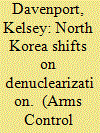|
|
|
Sort Order |
|
|
|
Items / Page
|
|
|
|
|
|
|
| Srl | Item |
| 1 |
ID:
153580


|
|
|
|
|
| Summary/Abstract |
During the Open Port period and Japanese colonial period (1876–1945), Koreans generally had a positive image of the United States. This positive view of the United States held by Koreans persisted until after liberation from Japanese colonial rule in 1945. The United States was a ‘liberator’ that saved the Koreans, and was viewed as ‘a cooperator’ with whom Korea was to solve its national task of establishing a new country. However, the concept of ‘American imperialist warmonger’ had begun to be promoted in North Korea from 1948–49. It was a concept advanced by the Soviet Union and the North Korean leadership. The negative image of the United States, which spread throughout North Korea from the early years of the Cold War, was merely a perplexing stigma lacking substantiated grounds. However, the experiences of the Korean War actualized the image of the United States as a ‘warmonger’ in the hearts of the North Korean people. Alleged indiscriminate aerial bombings, mass slaughters, sexual assaults, and arson attacks against Korean civilians became the most important reason for the expansion of intense sentiment. Anti-Americanism began to be systemized and routinized in every aspect of North Korean life after the Korean War.
|
|
|
|
|
|
|
|
|
|
|
|
|
|
|
|
| 2 |
ID:
083354


|
|
|
|
|
| Publication |
2008.
|
| Summary/Abstract |
This paper analyzes several leadership scenarios that might unfold in the wake of Kim Jong Il's sudden death or removal from power. Over the past year, the North Korean leadership has undergone numerous changes as key figures in the regime passed away, were purged, or retired (actively or figuratively). Whether this constitutes a generational turnover inside the leadership is open to interpretation. In addition, key institutions, such as the National Defense Commission, have been reconfigured in what appears to some as a step toward preparing the regime for the eventual post-Kim succession. At the same time, the regime is fraught with competing individuals and institutions that might play a role in determining the new leadership configuration. Besides examining the most popular scenario, dynastic succession, this paper examines the possibility of other scenarios, such as the rise of a military strongman, warlordism, collective leadership, as well as the likelihood that the regime will collapse. This paper argues that unless Kim Jong Il's prophesy to live to age 90 comes true, North Korea could face an uncertain, and potentially contentious, succession in the coming years. Predicting the outcome of this succession is not easy given the various factors that might be in play at the time of Kim's demise or removal from the political scene. One thing that seems clear is that the 1994 succession following Kim Il Sung's death holds few insights into the next succession. Only if Kim Jong Il were to live another 10 to 20 years is the likelihood of a smooth dynastic transfer of power a strong possibility.
|
|
|
|
|
|
|
|
|
|
|
|
|
|
|
|
| 3 |
ID:
046400


|
|
|
|
|
| Publication |
London, Hurst & Company, 2002.
|
| Description |
xvii, 202p.hbk
|
| Standard Number |
1850655634
|
|
|
|
|
|
|
|
|
|
|
|
Copies: C:1/I:0,R:0,Q:0
Circulation
| Accession# | Call# | Current Location | Status | Policy | Location |
| 046469 | 951.93043/LAN 046469 | Main | On Shelf | General | |
|
|
|
|
| 4 |
ID:
150302


|
|
|
|
|
| Summary/Abstract |
North Korea has publicly redefined its denuclearization policy, a move that some experts say may have been intended as an overture to resume nuclear negotiations until the U.S. decision to sanction the North Korean leadership likely closed off any opportunity for new talks.
|
|
|
|
|
|
|
|
|
|
|
|
|
|
|
|
|
|
|
|
|